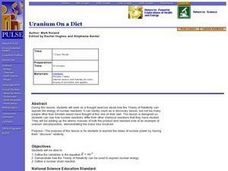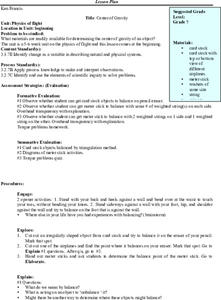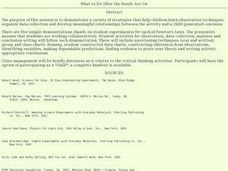Curated OER
Catapults
Students are introduced to the concept of a catapult and how it is used with the help of a media presentation. They use catapults in a large, open area and record the distances objects travel. Students use the scientific method while...
Curated OER
Lift Relationships
Students use FoilSim (downloadable) to determine how lift is affected by varying parameters on the Airfoil simulation.
Curated OER
Upside-Down Wings
Young scholars use FoilSim to demonstrate that the graphic analysis of the airflow around one object can be used to hypothesize airflow graphs for objects as they are elongated from a sphere to an airfoil shape.
Curated OER
Electromagnets
Students are introduced to the relationship between electricity and magnetism. Using a compass, they observe and record the effects of placing the object near magnetic fields and electric currents. They also experiment using a steel and...
Curated OER
How Does Altitude Relate To Density?
Students demonstrate an understanding of the properties of matter by applying them to density, pressure, and temperature. The educational software program, "Foilsim" is used in this inquiry.
Curated OER
Describing the Motion of a Battery Powered Cars
Learners explore distance a toy car travels by changing the amount of batteries used to power the toy car. In this force and motion lesson, students calculate the average speed of a car while investigating the power from various...
Curated OER
Elements In Chemistry: Solids, Liquids and Gases
Students investigate the kinetic-molecular theory. In this state of matter lesson, students consider the differences of melting glaciers, melting icebergs and investigate on what happens when submerged water melts.
Curated OER
Uranium On a Diet
Students examine how nuclear reactions differ from other chemical reactions they have studied. They add up atomic masses of both the product and reactant side of an example of uranium decomposition, demonstrating mass loss involved.
Curated OER
Using Mathematic Models to Investigate Planitary Habitablity
Students examine how the sun's intensity affects the temperature on various planets. They determine whether or not these planets could be habitable. Finally, they factor in the average albedo of the planets to determine whether or not...
Curated OER
Soil Morphology
Students analyze images of five different soil types from various locations and discuss how climate, vegetation, parent material, topography, and time can contribute to soil characteristics.
Curated OER
What Can We Lose? What Do We Lose as we Gain Force With A Lever?
Third graders view a demonstration of a teeter totter as a basis for assessing pre-knowledge of a lever. They create a KwL chart. Students work in small groups to conduct a variety of experiments. The first requires students to tie books...
Curated OER
Survival
Young scholars determine the best material from which to make a jacket to keep the body warm in a cold, dry, windy climate. This task assesses the student's abilities to perform an entire investigation.
Curated OER
Transformations of Energy
Seventh graders investigate the relationship between energy and matter, and measure the mass of various objects. They listen to a teacher-led lecture about potential energy, and in small groups measure the mass of various objects such...
Curated OER
Free Fall Graphing Exercise
Twelfth graders practice their graphing skills in an exercise about acceleration due to gravity. Lesson opens with a demonstration of acceleration due to gravity and a brief discussion. Students complete a worksheet and go over answers...
Curated OER
Starch Yer Thinkin' About Corn Products
Seventh graders study the parts of corn and explore the role of starch. In this corn products lesson students prepare a model of water and stones.
Curated OER
Center of Gravity
Seventh graders determine the center of gravity of an object. They get card stock objects to balance on pencil eraser and a meter stick to balance with same # of weighted string(s) on each side. They get meter stick to balance with...
Curated OER
Keep the Environment Clean
Students discuss ways our environment becomes polluted. They make a list of ways to keep it clean.
Curated OER
Land Safely...
Students model the preparation needed for a soft-landing on a planet or object in space. They do this by packaging a raw egg with certain material, and dropping the egg from a given height to test the packaging effectiveness.
Curated OER
What To Do After The Hands-Are-On
Young scholars perform various demonstrations for each of Newton's Laws, collect data, and write a conclusion for each.
Curated OER
Meteorology (Condensation)
Second graders define condensation and evaporation. They identify and describe the steps in the water cycle. They ask questions to end the lesson.
Curated OER
Coat Caper
Students examine pollen and fibers taken from a garment. They analyze pollen from new hybrids and compare it to the samples from the garment then make individual conclusions concerning the specific historical authenticity of the garment.
Curated OER
Coffee Cooling
Students explore the factors that affect how long coffee stays hot. They develop a question and a testable hypothesis for one factor such as initial temperature or size of opening of the container. Then they design and conduct an...
Curated OER
That's the Way the Ball Bounces
Students investigate and compare the bouncing ability of the materials from which four different balls are made. They determine which material performs the best for use as a basketball. After collecting data in a small group they...
Curated OER
The Nutritional Content of Food
Students are given three unknown samples and must perform two chemical tests in order to determine if the samples contains protein and/or starch. Students work with corrosive or toxic reagents.























